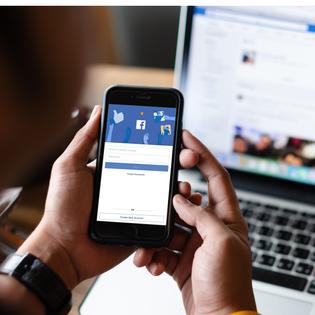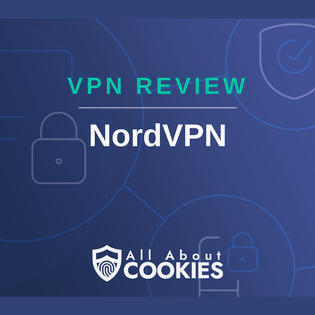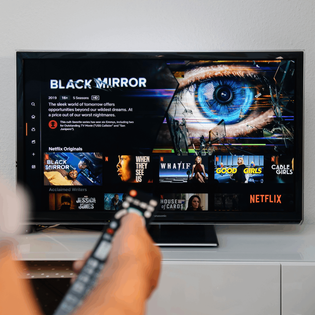Advertiser Disclosure
All About Cookies is an independent, advertising-supported website. Some of the offers that appear on this site are from third-party advertisers from which All About Cookies receives compensation. This compensation may impact how and where products appear on this site (including, for example, the order in which they appear).
All About Cookies does not include all financial or credit offers that might be available to consumers nor do we include all companies or all available products. Information is accurate as of the publishing date and has not been provided or endorsed by the advertiser.
Editorial Policy
The All About Cookies editorial team strives to provide accurate, in-depth information and reviews to help you, our reader, make online privacy decisions with confidence. Here's what you can expect from us:
- All About Cookies makes money when you click the links on our site to some of the products and offers that we mention. These partnerships do not influence our opinions or recommendations. Read more about how we make money.
- Partners are not able to review or request changes to our content except for compliance reasons.
- We aim to make sure everything on our site is up-to-date and accurate as of the publishing date, but we cannot guarantee we haven't missed something. It's your responsibility to double-check all information before making any decision. If you spot something that looks wrong, please let us know.
Virtual private networks, or VPNs, are commonly used to bypass geo-restrictions with popular streaming services such as Netflix. So if you’re wondering how to watch Netflix with a VPN or how to change your Netflix region to access different content, you’re in the right place.
I’m a big fan of Netflix, Hulu, HBO Max, and other streaming platforms. But I also love to travel, often internationally. I typically use a VPN while traveling so I don’t miss out on the latest TV shows and movies that might not be available in a country I’m visiting (but are still available in the U.S. or elsewhere).
Here’s how to get started with watching Netflix with a VPN. And don’t worry, it’s a simple process that requires little to no tech knowledge and is entirely legal in most countries (more on this later).
Which VPNs work with Netflix?
4 free VPNs that work with Netflix
How to choose a VPN for Netflix
What if my VPN won’t unblock Netflix content?
Why does Netflix show different content in different regions?
Can Netflix suspend my account if I use a VPN?
How to change your Netflix region without a VPN
Watching Netflix with a VPN FAQs
Bottom line
How to watch Netflix with a VPN
Here are a few simple steps to follow if you want to watch Netflix with a VPN, followed by our step-by-step guide:
- Buy a Netflix subscription if you don't have one yet.
- Find a VPN that unlocks Netflix, such as NordVPN, ExpressVPN, or Surfshark.
- Purchase a VPN subscription or start a free trial — most VPNs offer a 30-day money-back guarantee.
- Open your VPN app and choose a server in the country whose Netflix library you want to unblock. For example, if you want to watch U.K. Netflix, you should choose a server in England or Scotland.
- Connect to the server you chose in step 4.
- Open Netflix and start watching.
Check out our walkthrough to see how we used these steps and the CyberGhost VPN to connect to a U.S. server while being physically located in the U.K.
1. Buy a Netflix subscription if you don’t already have one

2. Find a VPN that works with bypassing Netflix geo-restrictions. (Popular VPN providers such as NordVPN, ExpressVPN, Surfshark, and others typically advertise their functionality with different streaming services, including Netflix.)
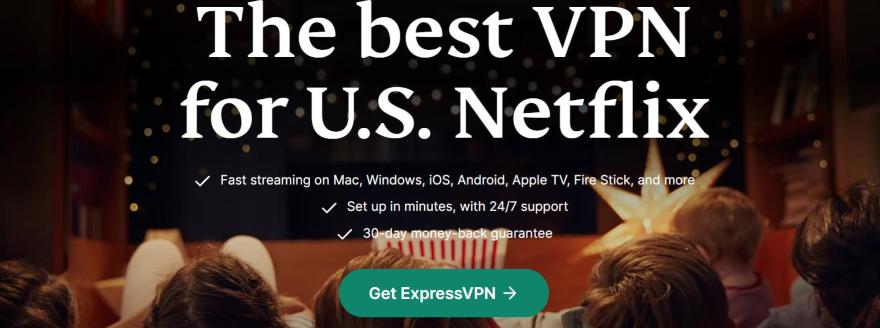
3. Buy a subscription or start a free trial with your chosen VPN service
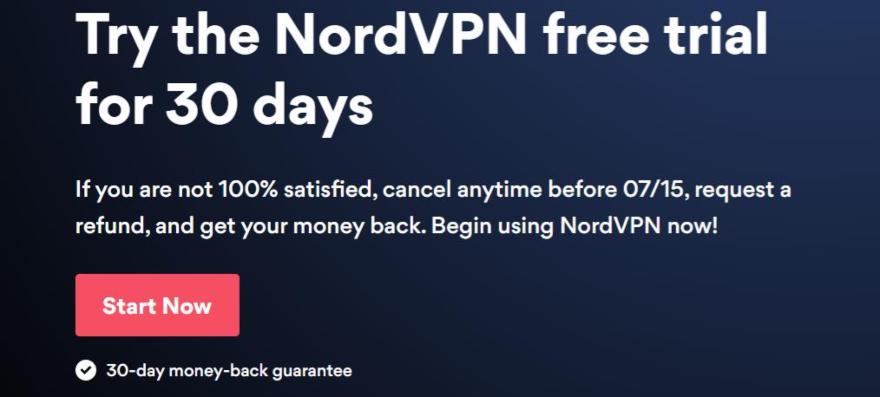
4. Start your VPN and select a server
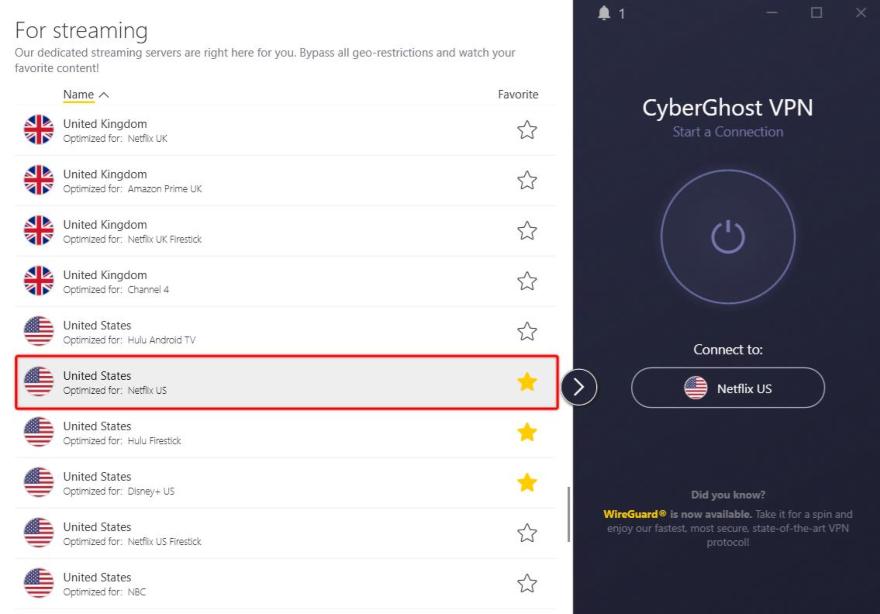
5. Connect to the chosen server
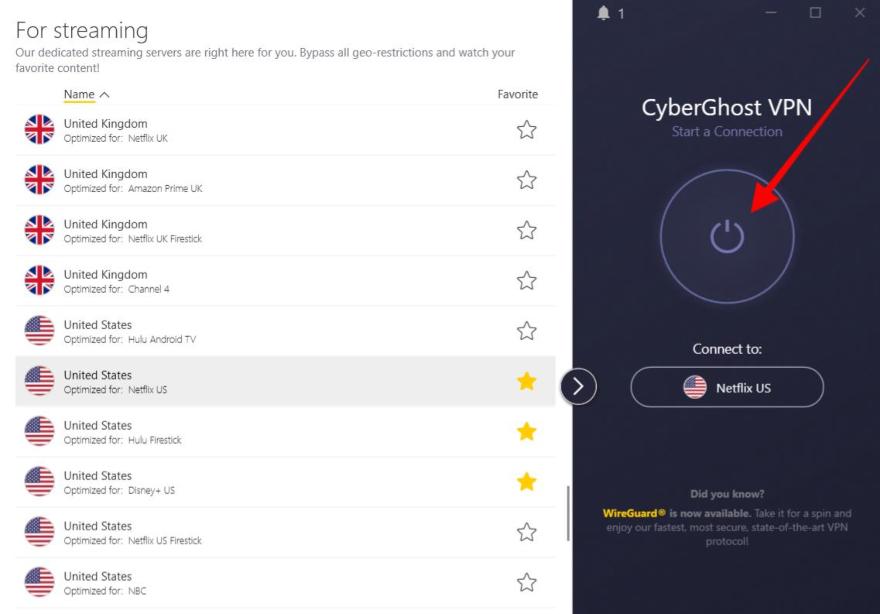
6. Boot up Netflix and watch content with a VPN
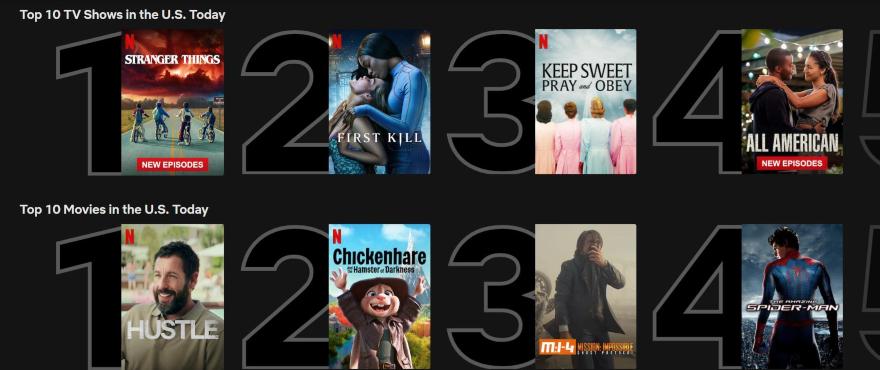
As you can see from the screenshot in step 6, Netflix displayed the top trending shows in the U.S. at the time rather than what was trending in the U.K., which indicates a resounding success using a VPN to bypass Netflix geo-restrictions.
Further research found that the movie “Mission Impossible: Ghost Protocol” (shown in step 6) was available in the U.S. content library, but not the U.K. library. So if accessing Netflix content in other countries is your goal, using a VPN is a simple way to get there.
Why do you need a VPN to watch Netflix?
If you create a Netflix account, it’s typically associated with the country where you live. This would be your Netflix region, or an area of the world that has access to a specific Netflix library. For example, U.S. residents can access Netflix content available in the U.S.
You can’t manually change your Netflix region in your account settings because there are strict guidelines in place called geo-restrictions. The only way Netflix allows you to change the country on your account is by moving to a new one.
In this case or if you’re traveling internationally, your Netflix region should automatically update as you move between countries. This would give you access to the content available to each of those countries.
But what if you want to watch Netflix content from other countries than where you’re currently located?
This is typically where you need a VPN. There are ways to change your Netflix region without a VPN (more on this below), but using a VPN is likely the easiest and most effective way to bypass geo-restrictions on streaming services.
Which VPNs work with Netflix?
It was mentioned in the previous section that you should find a VPN that works with bypassing Netflix geo-restrictions. That’s because not every VPN will do the trick.
Netflix actively tries to reduce VPN usage on its platform because each region is only supposed to have access to certain content. This has to do with licenses Netflix has to allow certain shows and movies in different countries.
But even with Netflix trying to stop its users from accessing content with VPNs, there are still plenty of VPNs that work with Netflix.
VPNs that work with Netflix
These are some of the best VPN services on the market according to our research. But are they also the best Netflix VPNs? Let’s see how they compare.
| VPN | U.S. to U.S. | U.S. to U.K. | U.S. to Canada | U.S. to Australia | Price range | Details |
 NordVPN |
$2.99–$14.99/mo | Get NordVPN Read Our NordVPN Review |
||||
 ExpressVPN |
$6.67–$12.95/mo | Get ExpressVPN Read Our ExpressVPN Review |
||||
 Surfshark |
$1.99–$19.99/mo | Get Surfshark Read Our Surfshark Review |
||||
 Private Internet Access |
$2.03–$11.99/mo | Get Private Internet Access Read Our PIA Review |
||||
 PrivadoVPN |
$1.11–$10.99/mo | Get PrivadoVPN Read Our PrivadoVPN Review |
||||
 CyberGhost |
$2.03–$12.99/mo | Get CyberGhost Read Our CyberGhost Review |
||||
 IPVanish |
$2.99–$12.99/mo | Get IPVanish Read Our IPVanish Review |
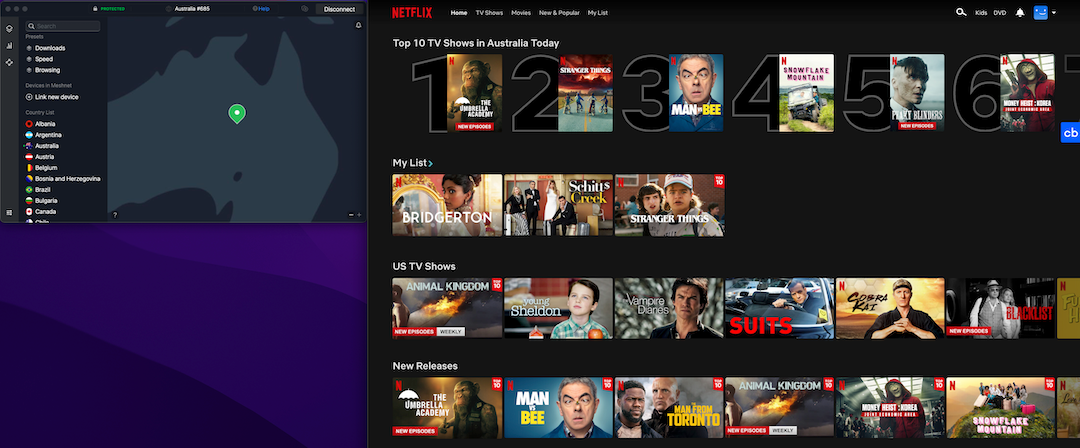
NordVPN successfully connected us to UK, Canadian, and Australian Netflix libraries from our US location.
VPNs that don’t work with Netflix
Netflix is continually battling with VPN users to prevent them from accessing the streaming platform. As such, VPNs may suddenly stop working properly with Netflix at nearly any time, and there’s no real way to guarantee that this won’t happen.
As of this writing, nearly every major VPN we’ve tried works with Netflix, with one exception — Mozilla VPN. It just doesn’t want to work, so if Netflix is a high priority for you, you’ll want to steer clear of Mozilla.
4 free VPNs that work with Netflix
VPNs can be pricey, so you may be wondering if there are any free VPNs that can unblock Netflix. There are, but before we look at them, there are a few things you should understand about free VPNs.
First of all, it’s important to understand that there is no such thing as a truly free VPN. These are expensive services to operate, and most of the free options available are limited versions of premium products that are designed to incentivize you to upgrade. For example, you might get a limited number of servers to choose from, or a limited amount of data, or limited speed — or all three.
There are some VPNs on the market that claim to be entirely free, but the provider has to keep the lights on and the servers running somehow. In practice, that means you’re paying these providers with your personal data rather than money. Many have sketchy privacy practices and bad reputations, and we generally advise users to steer clear.
The nature of a VPN means you are entrusting these companies with a lot of personal information. Make sure you opt for one from a reputable brand.
With that out of the way, let’s look at some free options that work with Netflix and have reasonable limitations.
1. Atlas VPN
Atlas VPN is a newer VPN provider that’s made some big waves in the space — so much so that it was acquired by NordVPN, another major provider.
Atlas VPN offers excellent performance and works with nearly all major streaming platforms, including Netflix. Our main concern here is the small server network — although it’s growing continuously, it’s still much smaller than many other providers.
2. PrivadoVPN
Privado VPN offers a fairly generous free tier with 10 GB of data per month — enough for 10–20 hours of Netflix streaming. That may not seem like a lot, but for a free VPN, it’s not bad.
It also works on a number of streaming services in addition to Netflix, including Disney+ and Amazon Prime Video. The big downside with PrivadoVPN’s free tier is that it only supports one connection. The apps also aren’t quite as solid as some other providers’.
3. Windscribe
Windscribe is another VPN with a rather generous free tier: 10 GB per month of data.
It also offers a choice of servers across 11 countries, which is more than most other free VPN plans (many offer only a single country to free users). Windscribe’s main issue is its exceptionally complex apps — you get a lot of options, but at the expense of user-friendliness.
4. Hotspot Shield
Hotspot Shield is a popular VPN that offers a large number of server locations and a simple, useful interface.
The paid version is a solid, but pricey, all-purpose VPN. Hotspot Shield does offer a free version, but unfortunately, it’s throttled to just 2 Mbps — painfully slow, particularly for streaming.
So, while it’ll work for Netflix, the experience won’t be particularly good. You’re also limited to 500 MB of data per day, which isn’t a lot (though better than some other free options).
Check out Hotspot Shield’s plans.
How to choose a VPN for Netflix
If you’re still considering using a VPN to watch Netflix, there are a few key features to watch for. Price is, of course, a major consideration, but it’s not the only one — the number and location of servers, along with performance and privacy, are also top things to look for.
Price
Obviously, price is a consideration when choosing a VPN — it’s the main consideration, for many. There are free options out there, but unfortunately, they tend to have harsh limitations that make them less than ideal for streaming Netflix.
In terms of paid plans, the price of a VPN usually falls somewhere in the range of $10–$13 per month, often with steep discounts if you opt for a yearly commitment rather than month-to-month.
Server locations
One of the most important aspects of a VPN is the location of its servers. This is true from a privacy standpoint, of course — you definitely want the servers in a different country to minimize the chances of any problems.
Server location is also important for Netflix (and other streaming services). Essentially, you need to ensure that there are servers available in the country that you want to pretend you’re in. So, if you want to watch U.S. Netflix, you need U.S. servers. If you want to watch U.K. Netflix, you need U.K. servers.
Additionally, more servers in a given country is always a plus. If everyone using the VPN wants to use U.S. servers, you want that traffic spread out among a large number of servers, rather than clogging up one or two.
Internet speed and data
We probably don’t need to tell you that speed is important when it comes to an internet-based service like streaming. Unfortunately, this has historically been a weak point for VPNs — you’ve often had to sacrifice speed and performance for privacy.
The good news is that these days, thanks to new protocols, you can get speeds comparable to a direct connection when using a VPN, although a little slowdown is likely unavoidable.
However, for streaming, you definitely need a solid performer. You want to look for a VPN that uses the WireGuard protocol — these tend to offer the best overall performance.
Additionally, it’s important to ensure your VPN has either no data cap or one that’s so high you’ll never realistically reach it. Streaming video uses a lot of bandwidth, and you can quickly max out a limited data plan.
To give you an idea of how much you’ll need, Netflix claims that HD video can use up to 3 GB per hour, while 4K can use up to 7 GB per hour. This can add up to a lot of data use over the course of a month.
Number of simultaneous connections
If you live in a multi-device household (and you almost certainly do), you’ll want to make sure that your VPN provider supports enough simultaneous connections to cover your use.
Even people that live alone likely have multiple devices that they may want to connect at the same time — say, a smartphone and a laptop or tablet. If you ever have guests over or don’t live alone, the number of connected devices you require a VPN for can rapidly increase.
You don’t want to have to shuffle connections around or ask guests to hop off the Wi-Fi, so ensure that your VPN gives you a healthy number of simultaneous connections. Some offer unlimited, which is ideal.
Privacy and no-logs policies
This one is important. Many people using VPNs do so for privacy reasons — but even if you aren’t particularly worried about privacy, you don’t need yet another entity tracking your online activity.
To that end, look for a VPN provider that has a zero-logs policy, or close to it. This means they keep no logs of user activity, whether personally identifying or not. The only logging we’d say is acceptable is the bare minimum required for maintenance. There’s really no other reason for a VPN provider to keep logs.
Device compatibility
Finally, you’ll need to make sure your VPN provider is compatible with the devices you use on a daily basis. Most offer Windows and Mac compatibility, but if you stream on your iPhone all day, that’s not going to do you much good. To account for potential guests and device changes, we recommend a VPN that supports Windows, Mac, iOS, and Android (at a minimum).
What if my VPN won’t unblock Netflix content?
You have a VPN and you try to use it for Netflix, but it doesn’t seem to be working. This could be the case even if the same VPN was working in the past. It’s a frustrating situation that more than a few of us have found ourselves in.
Here are a few tips to try if you find yourself in this predicament:
Switch to a different VPN server location
This is the first and easiest solution to try. Netflix is aware of users accessing content in other countries with VPNs. If it detects unusual activity with IP addresses, it could block them.
An IP address, or internet protocol address, is a unique number assigned to an internet-connected device such as a computer or phone. Each IP address typically provides certain information, which could include the country and city where the device is physically located.
Choosing a VPN server in another country changes your IP address and makes it seem like your device is located in that country. This is typically how you can bypass Netflix geo-restrictions, but Netflix can ban or block VPN IP addresses.
By trying a different server, you’re basically testing whether another IP address would work with Netflix.
Contact your VPN provider’s support team
VPN providers often have customer support teams that can walk you through possible next steps if you run into an issue. And if you specifically purchased a VPN subscription to use with Netflix and it’s not working, you’ve run into an issue.
Use a Smart DNS service
This tip could be slightly more technical than simply using a VPN to connect to a server. But it still shouldn’t be overly complicated, especially if you use a service that walks you through the steps.
Certain services, including some VPN providers, offer Smart DNS tools to change your DNS server addresses. Without diving too deeply into the details, Smart DNS is a way to potentially change your Netflix region without using a VPN.
Keep in mind that Smart DNS services aren’t the same as VPNs. They could help with unblocking Netflix content, but they likely wouldn’t provide much in terms of online safety.
Check out how Smart DNS works with NordVPN.
How to speed up your internet with a VPN
VPNs basically work by rerouting your traffic through a secure and encrypted internet connection. You could potentially experience slower connection speeds when connected to a VPN, as this is another step in the process of connecting to the internet.
If you find you have issues with Netflix buffering while connected to a VPN, consider these tips:
- Close out other windows, tabs, and applications
- Try a different VPN server
- Connect to your router with an ethernet cable rather than Wi-Fi
- Disconnect other devices in the house from the internet
- Kindly ask your roommates to stop hogging the bandwidth so you can watch Netflix in Japan, Germany, or France
Why does Netflix show different content in different regions?
Netflix shows different content in different regions because of licensing agreements. This means it has certain licensing agreements in place for its content in different countries.
For example, the streaming service could have a license to show a movie in the U.S., but not have a license to show that same movie in the U.K or Australia.
Can Netflix suspend my account if I use a VPN?
Netflix can presumably suspend your account if you use a VPN to watch content that wouldn’t typically be available to you. But will Netflix suspend your account? Probably not.
So why can Netflix presumably suspend my account if I use a VPN?
It’s technically against the Netflix terms of service to watch any content on the platform that’s not available in the country associated with your account. For example, U.S. Netflix users shouldn’t typically be able to access all the content available to Netflix users in Mexico.
They’re different regions and Netflix has separate licenses for its content catalogs in different countries.
This doesn’t necessarily mean you’ll be banned from using Netflix if you use a VPN or other method to spoof your location. But you could receive a message from Netflix that says you’re using a VPN or similar service and prevents you from using the platform until that service is turned off.
So there’s nothing illegal with using VPNs for Netflix?
Yes and no. There’s nothing inherently illegal about using a VPN for Netflix, it’s just against the Netflix terms of service.
But another question you might ask is, are VPNs legal everywhere? And no, they’re not.
Certain countries have restrictions on how VPNs are used and their legality could fall into a bit of a gray area. Though, most countries have no laws against using VPNs. Still, it’s best to check local VPN laws and restrictions if you plan on using a VPN in another country.
How to change your Netflix region without a VPN
You might want to change your Netflix region if you’ve moved to another country or are traveling internationally. But Netflix doesn’t allow you to manually change you region whenever you want.
Rather, your region will automatically update to wherever you’re physically located. This could get frustrating if you want to watch Netflix content from another country.
Using a VPN is typically the easiest way to spoof your location and change your Netflix region. But if you want to change your Netflix region without a VPN, consider a Smart DNS service.
This type of service doesn’t often offer the same online security as a VPN, but it could help you bypass Netflix geo-restrictions. Here’s how to get started:
1. Find a Smart DNS service, MediaStreamer from ExpressVPN, Control D, and NordVPN SmartPlay are a few examples
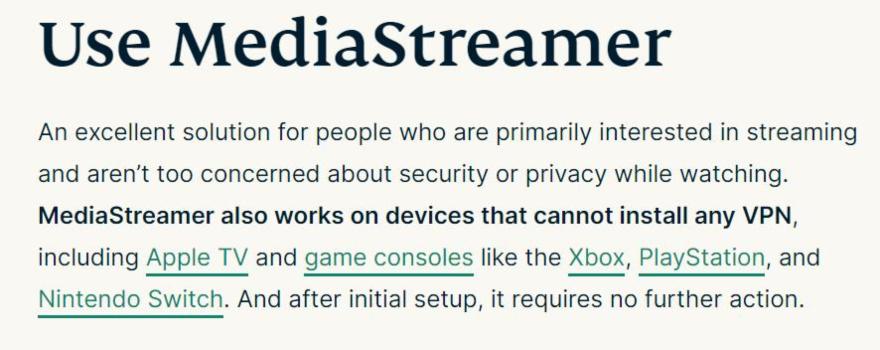
MediaStreamer Smart DNS tool from ExpressVPN.
2. Purchase a subscription or start a free trial
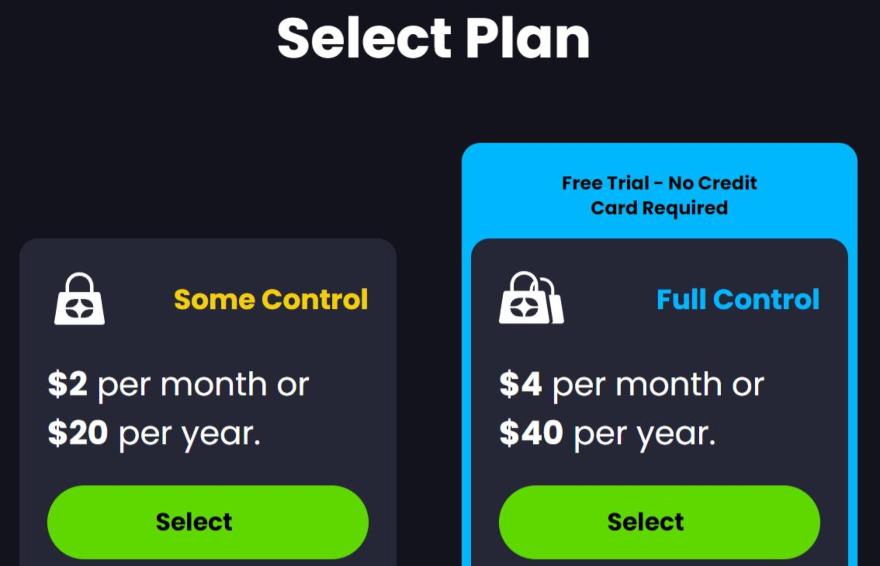
Available subscription plans from Control D.
3. Follow the instructions (like these from Surfshark) to get set up and start streaming
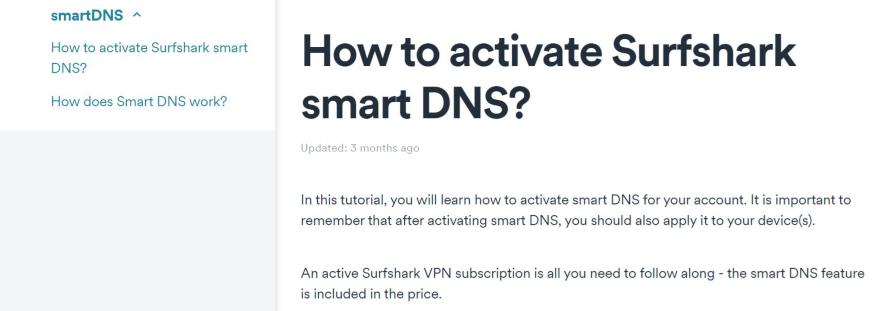
Smart DNS activation instructions from Surfshark.
Watching Netflix with a VPN FAQs
Can you use Netflix with a VPN?
Yes, you can use Netflix with a VPN. This is a common strategy for watching streaming content that might not be available where you live. You might use this method on any of the following devices:
- Smart TV
- Amazon Fire TV
- PlayStation or Xbox consoles
- Android devices
- Apple iOS devices (iPhone, iPad, Mac, etc.)
Can I watch Hulu with a VPN?
Yes, you can watch Hulu with a VPN. Hulu isn’t available outside the U.S., which would typically prevent you from watching Hulu content if you’re traveling or living abroad. Certain VPNs can help you bypass this restriction and use Hulu internationally.
Can I watch Amazon Prime Video with a VPN?
Yes, you can watch Amazon Prime Video with a VPN. Certain Prime Video content might not be available outside the U.S., which is where a VPN could be useful. Using the right VPN can help you avoid streaming restrictions so you can watch Prime Video as if you were in the U.S.
Can I watch Disney+ with a VPN?
Yes, you can watch Disney+ with a VPN. This could be useful if you want to access content on this streaming service that’s not available in your country. For example, Disney+ offers content through the Star brand in certain international markets. The easiest way to access this content from the U.S. would likely be to use a VPN.
Can I watch BBC iPlayer with a VPN?
Yes, you can watch BBC iPlayer with a VPN. Using BBC iPlayer to stream content is typically geo-restricted to the U.K. But you could bypass this restriction with a VPN and stream BBC iPlayer content from just about anywhere.
Bottom line
The main reason to use a VPN with Netflix is likely to bypass geo-restrictions and access content that’s not available in your country. You can typically do this in a few simple steps:
- Find a VPN that advertises being able to bypass Netflix restrictions
- Buy a subscription or start a free trial with your selected VPN service
- Use your VPN to connect to a recommended server for Netflix and start streaming content
Keep in mind that not all VPNs are the same. Some are free. Others are paid. The online security offered by each service could vary — though paid VPNs are typically safer than free VPNs. Learn more about what a VPN is to see how VPNs work and the different reasons you might use one.
-
High-quality VPN offering safety and speed
-
Loads of servers for multiple connection options
-
Works with popular streaming services, including Netflix
-
Too many confusing plans
